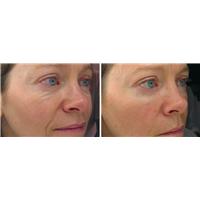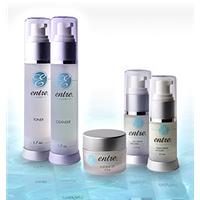Tag Archives: younger
FREE tickets for The Vitality Show at London’s Earls Court
Look younger – get firmer and plumper lips

London: Fuller and firmer lips help a woman look younger, according to new research by scientists.
The scientists, in a study funded by Unilever, studies the faces of 102 pairs of white Dutch female twins aged 59-81 and 161 Individual British white women aged 45-75.
They found that ageing manifesting in wrinkles, sun damage and age spots was influenced by genetic and environmental factors in equal amounts. But lip height was genetic.
Most ageing of lips begins between the ages of 30 and 40 when shrinking first starts.
David Gunn, a research scientist at Unilever said they study noted that women who looked young for their age usually had fuller and firmer lips.
He added: “It is a feature that is strongly genetically determined and relatively easy to measure.”
He also said there was little advantage in middle-aged and elderly woman getting lip implants as it did not counteract the impact of ageing on the rest of the face.
The research was carried out by seven universities, including St Andrew’s in Scotland.
Top Aging Tips from Actress Nanette Newman and daughter Emma Forbes


London: Listen to showbiz mother Nanette Newman and duaghter Emma Forbes’ on graceful and effortless ageing.
Nanette Newman is one of Britain’s most glamorous grannies, and her daughter Emma Forbes is following in her mother’s pedicured footsteps – but how do they look so young at their respective ages?
In this video feature Nanette and Emma talk about what keeps them in fine fettle, including hair, make-up and other little tips for not only feeling great but looking great too.
Where Nanette and Emma lead others can follow – and they are. Ordinary women are preserving their looks and joie de vivre – pushing the boundaries of staying fit, healthy and desirable well into middle age and beyond. Most of us also realise that looking after our eyes is also vitally important. In fact according recent research by Optrex Actimist Eye Spray, two-thirds of us are aware that eating a balanced diet can help maintain good vision.
So whether it be eating more fruit and vegetables, drinking more water, or taking more exercise – today we are more aware of the simple lifestyle changes we can make to stay fit and healthy. But for some inside tips on how the age with a little extra glamour and style from Nanette and Emma
Listen to Emma & Nanette here
Can Yoga stop you ageing? by Patricia Ezechie
London: In a society obsessed with looking young and where youth and beauty are prized above all other attributes, it is not surprising to learn that more than 22% of women in Europe use anti-ageing skin creams every week, spending billions of pounds every year on treatments and preparations in the hope that any signs of ageing can at the very least be halted if not reversed.
With more and more people also viewing cosmetic surgery and non surgical interventions like botox, fillers, peels and plumpers as essential tools in the battle against the ravages of time, could a practice as simple (and inexpensive) as yoga be the answer? Can yoga halt and maybe even reverse the ageing process?
Before you start reaching for the phone to cancel that botox appointment while simultaneously hurling your eye wateringly expensive skin preparation into the bin lets agree on what constitutes ageing. Is ageing the fact that your breasts and bottom are not quite as pert as they used to be, or is it that when you smile you have laughter lines? Is it the fact that your waist is not quite as waif like as it once was, or that when you look in the mirror these days its seems to be your mother looking back at you?
I would agree that all of the above are physical manifestations of the ageing process, but only part of the picture with the focus being purely on the external. Is it these physical changes or the number of years you have been around that should define how old you are or feel?
The Eastern view of age is very different. In Yoga it is the age of the spine, not the number of years (or pertness, or evidence of wrinkles) that determines an individuals age. It is the elasticity and flexibility of the spine, the tone of the tissues, ligaments joints and nerves and the relative smooth functioning and health of the bodies systems that determines age.
Before you groan and switch off please note that an added benefit of increased mobility and flexibility is increased tone (pertness), increased blood supply to all of the bodies organs (including the skin which is one of the largest organs in the body leading to plumpness and firmness) and improved posture (strengthened and toned abdominals and back). Yes, the regular practice of yoga does provide all these benefits.
Spinal health is key in the battle against age. The spine, made up of 33 irregularly shaped bones (or vertebrae), intervertebral discs, facet joints, muscles, ligaments, tendons, nerves, cord and canal act as a strong yet flexible column and support for the whole body, providing and enabling the power of movement and bearing the weight of all the organs and appendages attached. When practicing yoga, the joints of the body are moved through their full range of motion, encouraging mobility and easing pressure.
The gentle stretching during asana practice (this is the physical element of yoga), releases muscle tension, stretches the joints causing the secretion of synovial fluid into the joints keeping them healthy and supple resulting in reduced stiffness preventing conditions such as arthritis and helping to improve the condition if it already exists (by very gentle practice with a qualified and experienced teacher).
Regular and continued practice of asana encourages strength and endurance, leading to increased tone in all the muscles of the body, improved blood circulation with the added benefit of the focusing on the breath helping to soothe and calm the nervous system.
The beauty of the practice of yoga is the more continued and sustained the practice the more cumulative the effects, with the long term benefits including reduced stress and anxiety levels and increased feelings of health and well being. As the nerves of the brain and spine go to every tissue in the body and therefore every tissue in the body depending upon the health of the brain and spine, the importance of the spine in the fight against age becomes apparent.
Healthy and flexible spine, healthy, flexible and youthful body! When we also factor in that during the practice of yoga the skin is continually being stretched causing stimulation of the skin cells and endocrine system resulting in firmer, healthier skin, I think the assertion that yoga can slow and possibly stop the ageing process is no idle boast.
The miracle of yoga is that it is suitable and can be of benefit to everyone, irrespective of age, size, sex, or ability. It is never too late to begin, does not require loads of costly equipment and the benefits can be felt almost immediately. The practice encourages and engenders balance in all things and an awareness of the mind and body that will enable all those who participate to begin to make positive and healthful changes to their lives.
In a society so highly focused on the external it is perhaps a timely reminder that the most sustained and maintainable changes and improvements to the visible body are as a result of the correct and efficient working of the internal elements of the body. Get the inside working efficiently and the outside will reflect these changes with lustre and youth.
Getting older is inevitable and no amount of lotions, potions or interventions (surgical or otherwise) can hide the results of age indefinitely. We should be aspiring to embrace the wisdom and freedom that comes with increasing age while maintaining our physical and mental health, fitness and mobility, by practices like Yoga that both nurture and nourish the body and mind.
Can yoga stop you ageing? If youthfulness is defined as energy and vitality, mobility and strength, suppleness and stamina then yes yoga can!
Patricia Ezechie, is a BWY, Sivananda and Birthlight trained yoga teacher. She has been practicing yoga for 13 years and is the owner of www.yogastickmen.com where full details of all her classes and workshops can be found.
Yogastickmen.com have launched a new range of T-shirts, for autumn/winter 09. Perfect for wearing in yoga class or out for a jog in the park, the T-shirts come in an array of brooding autumn colours. To look at the range of colours visit www.yogastickmen.com
Banish wrinkles with radio waves – see the video


London: The world’s first salon-grade radio-frequency anti-ageing skin device is now on sale in the UK.
This is yet another amazing anti-ageing gadget from those technical innovators in Israel. Priced at just £470 (Euro 490) it is a mini version of the in-salon ReGen treatment – to combat wrinkles and cellulite.
It works by using two kinds of radio (Tripollar Radio Frequency) frequencies to heat up the collagen under the skin. This has an immediate and visable tightening effect. Over the next few weeks it works on the fibroblasts in the epidermis which create new collagen and younger skin.
This new gadget, is plugged into your electricity powerpoint, has a safety feature which cuts out the power when the skin has reached the optimum temperature – and turns on again when it has cooled down. The radio-frequency energy penetrates a mere 1-3mm and feels like a warm massage.
STOP has four metal “poles” which you hold against the skin. It is recommended mainly for facial, neck and decollete use – for lifting sagging jowels and chin, neck lines, facial wrinkles and marionette (nose to mouth) lines. And should be used 2-3 times a week until the desired effect has been achieved.
It seems easy to use and only takes a few minutes for each session. See the video…
Certainly the before and after photos at the London launch this device looked fantastic. The gadget is fairly affordable and would probably achieve optimum results after a few of the more powerful salon treatments.
Click on this link for more information/or to buy STOP


Healthy lifestyle boosts anti-ageing enzyme

Los Angeles: A healthy diet, taking regular exercise and relaxing can boost levels of a longevity enzyme, say scientists.
In a new study scientists measured levels of the telomerase enzyme in men who were required to make positive lifestyle changes. The men were suffering from low-risk prostate cancer.
The patients ate a diet low in sugar and fats and rich in whole foods, fruits and vegetables. They were also required to walk at least 30 minutes daily and take part in anti-stress exercises.
The researchers, whose report has appeared in the medical journal, The Lancet Oncology, measured the amount of the enzyme after three months. The results revealed that levels in the blood has increased by 29 per cent , along with a drop in LDL(bad) cholesterol.
The bottom line is that the enzyme helps support the length of telomeres – these are tiny protectors of the DNA and keep inflammation and other ageing activity away from them. The length of telomeres is an indicator of biological ageing.
As people age, their telomeres get shorter and they become more susceptible to certain illnesses which are associated with ageing.
Experts believe this process is at the heart of many age-related diseases, and may even place a final limit on human lifespan.
Professor Dean Ornish, of the Preventive Medicine Research Institute, Sausalito, California, who led the study, said increases in telomerase levels were beneficial and could be quickly changed.
He said: “To our knowledge, we have reported here the first longitudinal study showing that comprehensive lifestyle changes – or any intervention – are significantly associated with increases in cellular telomerase activity levels.
“The implications of this study are not limited to men with prostate cancer.Comprehensive lifestyle changes may cause improvements in telomerase and telomeres that may be beneficial to the general population as well.Larger studies are needed.”
Running slows ageing

New York: Scientists at the Stanford University Medical Center have found that jogging can slow down the ageing process.
In a study that lasted two decades they found that elderly joggers were half as likely to die prematurely from conditions like cancer than non-runners.
They also enjoyed a healthier life with fewer disabilities, according to the study which is published in the Archives of Internal Medicine.
The work tracked 500 older runners for more than 20 years, comparing them to a similar group of non-runners. All were in their 50s at the start of the study.
Nineteen years into the study, 34% of the non-runners had died compared to only 15% of the runners.
Both groups became more disabled with age, but for the runners the onset of disability started later – an average of 16 years later.
The health gap between the runners and non-runners continued to widen even as the subjects entered their ninth decade of life.
Running not only appeared to slow the rate of heart and artery related deaths, but was also associated with fewer early deaths from cancer, neurological disease, infections and other causes.
And there was no evidence that runners were more likely to suffer osteoarthritis or need total knee replacements than non-runners – something scientists have feared.
At the beginning of the study, the runners ran for about four hours a week on average. After 21 years, their weekly running time had reduced to around 76 minutes, but they were still seeing health benefits from taking regular exercise.
Lead author Professor James Fries, emeritus professor of medicine at Stanford, said: “The study has a very pro-exercise message. If you had to pick one thing to make people healthier as they age, it would be aerobic exercise.
“The health benefits of exercise are greater than we thought.”
Red wine retards ageing, concludes new research

Red wine which contains an antioxidant called resveratrol can remove fat from the diet, new research into its affect on ageing has revealed.
This confirms the speculation over why the French can eat a fatty diet but still remain healthy.
Earlier studies have already shown that resveratrol, also found in grapes, pomegranates and other foods.
In the journal PLoS ONE, the new research explains that even low doses of the substance in the diet of older mice may protect the heart. It is thought that resveratrol behaves in the same way as caloric restriction, a diet containing a full range of nutrients but with half the calories of a typical diet, which extends lifespan and cuts the risk of obesity, diabetes and cancer.
The study was carried out by the University of Wisconsin-Madison compared the gene use of animals on a restricted diet with those fed small doses of resveratrol. The authors concluded that a glass of red wine or supplements containing even small amounts of the substance could cease the rate of heart ageing.
Aerobic fitness delays ageing by a decade

London: Maintaining aerobic fitness in middle age and beyond could delay the ageing pby more than a decade and assist independent living, says a new review of research on aerobic fitness and dependency in old age.
Twenty years ago, Dr. R. J. Shephard of the University of Toronto in Ontario and his colleagues proposed that adequate aerobic capacity was a key factor in helping very old people to maintain a high quality of life and live independently. In a review published in the British Journal of Sports Medicine, Shephard analyzes the latest data on the issue.
Regular aerobic exercise improves the body’s ability to take in oxygen and use it, but a person’s maximal aerobic power falls steady as people age.
According to Shephard, studies of aerobic training response in older people have shown that workouts, especially more intense physical activity maintained for a longer duration, can improve aerobic power. In fact, seven studies of this type of exercise found people’s aerobic power increased nearly 25 percent — equivalent to reversing 12 years’ worth of aging-related loss of fitness.
Based on his review, published in the British Journal of Sports Medicine, Shephard concludes that elderly people who engage in progressive aerobic training can maintain their independence longer, in effect by turning back the clock on the loss of aerobic fitness that occurs with aging.
Other positive spin-offs of aerobic fitness include reduced risks of serious illness, faster recovery after injury or illness, and reduced risks of falls due to maintenance of muscle power, balance and coordination.
“There remains a need to clarify the importance of deteriorations in fitness relative to other potential causes of dependency but, from the practical viewpoint, regular aerobic activity can address many of the issues of both functional loss and chronic disease,” he writes.
Get the Hip Hop Body – win the DVD

Currently one of the world’s leading fitness presenters, Troy’s expertise spans 14 years in the industry. He regularly performs master-classes to over 2000 people at conventions all over the world. Endorsed by leading brand names, Troy is one of the most sought after trainers in celebrity circles and is about to revolutionise fitness through Hip Hop Body.
He has a body to die for, and if you want to look good too, hes your man.You will find out how to have fun exercising, burn calories, get the max definition in Troys new DVD, Hip Hop Body which has just gone on sale in UK shops.
There are five DVDs, each worth £17.99 for you to win. If you would like one of these DVDs please email us with your name and address and HIP HOP in the header to readeroffer@elixirnews.com by 7 April. The winners will be selected in a draw. No cash equivalent is beint offered and the Editor’s decision is final.
What is the Hip Hop Body workout – Troy answers your questions:
Hi Im Amy.
Im 16 and theres a really fit boy I wanna impress. My bodys not all that at the moment, and I wanna look buff. Its not about school sports, the dance floors bangin.
Hi Im Lucy. Im 22 and I work at Top Shop. Im never in on the weekends theres always someones guest list to be on and somewhere to be seen. I wanna stay trim but spandex makes me wanna die!
Lucy: My mate says youre The Man. Is it really true that youve trained stars like Colleen McLoughlin?
Troy: Yeah, and loads of others. But for me, its not about celebrity, its about
having the attitude. The girls you see working out with me in the DVD aren’t professional dancers but girls just like you.
Lucy: So whats Hip Hop Body then?
Troy: HipHop Body is THE new way to get the body you want. Forget the press ups and star jumps. Hip Hop Body will change the way you think about hip hop and fitness.
Amy: But fitness DVDs are just for your mum, arent they?
Troy: Thats where youre wrong. Hip Hop Body is all about expression, attitude, moves and the way you look.
Lucy: Sounds like hard work to me.
Troy: Thats where Hip Hop Body is different. Youll get the body you want and have fun at the same time – dance is a fantastic way to burn calories and you can do it with your mates.
Amy: Ive got a flabby tummy. Hows HipHop gonna help that?
Troy: Hip Hop Body is a complete body workout – there’s a special range of moves to tone your stomach and strengthen your core.
Lucy: I love dancing, but Im not an expert
Troy: Hip Hop Body is for everyone, from beginners to advanced.
Amy: But Im really into dance this isnt gonna be boring, is it?
Troy: The DVD has a routine for more advanced dancers. It concentrates on performance and is great for anyone whos really into dance. For the beginner, the work outs will give asense of direction and achievement.
Amy: Sounds cool. So where can we get this DVD then?
Troy: You can buy Hip Hop Body in all the shops now you can also see me in action
at www.myspace.com/troydureh
Exercisers are biologically younger, reveals new research

London: People who exercise regularly appear to be biologically younger than those who lead sedentary lifestyles, scientists have found.
Inactivity not only leads to a greater risk of ageing-related diseases, but it may also influence the ageing process itself, researchers believe.
A study of twins found there was a difference of about nine years of ageing between those who exercised regularly and those who did not, even after considering other influences including body mass index (BMI), smoking and socio-economic status (SES).
Researchers at King’s College London and in the US studied ageing in 2,401 twins by analysing telomeres, which cap the end of chromosomes in cells and protect them from damage.
Telomeres shorten with age, leaving people increasingly susceptible to cell damage which causes disease.
However there is considerable variation between individuals, and recent research has also linked lifestyle factors such as smoking and obesity with shorter than average telomeres.
Those who exercise regularly are already known to be at lower risk of cardiovascular disease, type 2 diabetes, cancer, high blood pressure, obesity and osteoporosis.
Comparing twins who were raised together but did different amounts of exercise, the researchers found that on average the telomeres were significantly longer in the more active twin.
The study concluded: “The US guidelines recommend that 30 minutes of moderate-intensity physical activity at least five days a week can have significant health benefits.
“Our results underscore the vital importance of these guidelines. They show that adults who partake in regular physical activity are biologically younger than sedentary individuals.”
Dr Nick Delgado – California
10% discount on Gold Rejuvenation Programme
Dr Nick Delgado PhD, CHT is a leading authority on anti-ageing and sexual medicine. He also specialises in hormone replacement therapy and nutraceuticals to aid rejuvenation.
To find out more:
Longevity accelerating, says new research

London: Longevity is accelerating and there are more 100 year olds than ever before, according to a new report by the Cass Business School.
They say that men born in 1985 can expect to live to an average age of 91, according to a new forecast of life expectancy which concludes that all existing projections are too low.
The Governments key forecast for longevity, which is also used in the pensions and life insurance industry, has seriously miscalculated how long men will live in the future, they also say.
Life expectancy is currently 76.6 years for men and 81 for women. The new research suggests that life expectancy for men born in 1985, who turn 65 in 2050, could be as high as 97 under the most optimistic scenario, although 91 is its central forecast. That is six years higher than the Office for National Statistics projection. The new Cass model has been applied only to men so far, but the next phase of the research will cover women.
The new calculation has serious implications for the Government and the pensions industry, who face having to pay an extra £160,368 per person in state benefits and occupational pensions, Cass calculates.
David Blake, director of the Pensions Institute at Cass Business School, said: Our calculations demonstrate that longevity is accelerating far beyond what is currently predicted, and there is considerable uncertainty surrounding future life expectancy. This will present a huge challenge for long-term healthcare providers and intensifies the problems faced by both government and the pensions industry. They need to update the projections they use before the pensions deficits reach catastrophic proportions.
Professor Blake said that the Office for National Statistics had a history of underestimating new trends: It completely underestimated the scale of the postwar baby boom, which had serious implications for the provision of schools and hospitals, and it has continually underestimated longevity of elderly people.
The Government has voiced concerns about the ageing population and has taken some steps to make provision for more older people. The retirement age is rising from 65 to 68 by 2044. Those actions were promoted by the ONS forecast that the proportion of over65s will go from 15 per cent now to 25 per cent by 2050. However, less provision for the older population has been made in healthcare.
The new centurions
– There are about 9,000 men and women over the age of 100, but the numbers are rising by 7 per cent a year
– By 2050, more than 150,000 people will be centenarians
– The costs of treating dementia and caring for sufferers have been calculated at £17 billion (and rising) per year
SkinGenesis clients front new ad campaign

SkinGenesis, a leading UK non-surgical cosmetic clinic has created a new advertising campaign by using real clients to promote their treatment range.
In order to fit in with their ethos of natural, effective treatments programmes, SkinGenesis did not want to use models to promote their skin and body treatments, but instead chose to select from within the huge number of their satisfied clients!
And there were no shortage of happy clients willing to wear the treatment they had on the chest in order to promote the clinic that had, in many cases, changed their lives. With treatments ranging from the purely cosmetic, such as teeth-whitening, to more therapeutic programmes to treat acne or thread veins, SkinGenesis boasts a client base as diverse their treatment menu.
For SkinGenesis, using real life success stories was a natural way to help promote their services as they pride themselves on the long term relationships built up with clients over a number of years. This consultative approach to treatment means that all visitors to the SkinGenesis clinic receive the best advice available, enabling them to make an informed choice about the treatments they need.
William Haseldine, Director of SkinGenesis said In the industry we work in, our clients really are our best advertisement. When they walk out of the clinic after finishing their treatment programme they become a great example of what SkinGenesis can do. Their readiness to talk openly about their treatments is a great testament to the impressive results weve gained for them.
SkinGenesis is a non-surgical cosmetic clinic established in 2003 with branches in city centre locations in Leeds and Manchester, and a new branch at the 10 BRIDGE Health and Wellbeing Clinic just outside Chester. SkinGenesis was set up by Peter Beard, Emma Parrish and William Haseldine with 200 clients undergoing treatment at each clinic at any one time.
Clinics are staffed by trained nurses and practitioners and are registered with the Healthcare Commission.
SkinGenesis offer Intense Pulsed Light (IPL), Microdermabrasion (Mda), Mesotherapy, Ultrasound Skin Toning, Laser Teeth Whitening, and the latest range of medical and resurfacing peels and de-pigmentation technologies which are safe, proven and non-surgical.
SkinGenesis offers a unique Satisfaction Guarantee on most of its treatments
SkinGenesis is an accredited Investor in People
William Haseldine and Peter Beard have appeared on BBC Radio Leeds, BBC Radio Manchester and Channel M television.
For more information visit www.skingenesis
Boosting our brainpower – how far should we go, ask doctors?

London: How many healthy people would take prescription drugs or go through an invasive medical procedure to improve their memory, concentration and other cognitive abilities?
In a thought-provoking discussion paper launched this week by the BMA, doctors discuss the ethics of healthy people seeking to improve their cognition and mental performance with pharmaceutical products or even medical operations to help their brains perform better.
The paper Boosting your brainpower: ethical aspects of cognitive enhancements1 has been produced by the BMAs Medical Ethics Committee (MEC) to stimulate public debate on this issue.
Chairman of the BMAs MEC, Dr Tony Calland, said today:
This is a fascinating area that has not been debated by the public. On the one hand, it may all seem very harmless how many of us take omega 3 supplements to prevent memory loss? On the other hand, we need to consider where this search for optimum brain performance will lead. Should drugs or medical procedures that are designed to treat medical conditions be used by healthy people who simply want to be better than normal?
We know that there is likely to be a demand by healthy individuals for this treatment. However given that no drug or invasive medical procedure is risk free, is it ethical to make them available to people who are not ill? Also, how much brain power is enough? There is a concern that there may be undue pressure, perhaps from employers, to ensure that workers are even more effective and productive. The BMA does not have the answers to these questions but we think it is very important that the issues are debated.
The BMA paper examines the effectiveness of various methods that have been suggested as possible cognitive enhancers, including:
Nutrition and nutritional supplements for example omega 3 supplements.
Pharmaceutical products – for example drugs that are used to treat attention deficit hyperactivity disorder or Alzheimers disease.
Brain stimulation and neurotechnology involving techniques such as transcranial magnetic stimulation (which has been referred to as botox for the brain) where magnetic pulses are used to stimulate particular areas of the brain or deep brain stimulation (which has been referred to as brain-lifts) – an invasive procedure involving the insertion of electrodes into the brain that transmit tiny electrical currents. There is at the moment no evidence that these procedures can improve cognition in healthy people, but the possibility cannot be entirely ruled out. It should be remembered that people are willing to endure major surgery to enhance their visual appearance, so they may be willing to do so to improve their cognitive ability as well, if the techniques prove to be effective.
The paper discusses the balance of benefits and harms related to cognitive enhancements. There may be individual benefits, in that a person might feel better in themselves and also positional benefits, for example, the modern-day UK is highly competitive with children judged from a young age on the basis of success in tests and exams and so individuals with a competitive edge may do better than others.
Harms include the side effects of taking prescription drugs long-term. The effects on healthy people of taking these drugs may be very different from someone taking them who has a medical condition that requires treatment.
There could also be unintended consequences, for example, our brains selectively filter out some information and memories, particularly those that are trivial or traumatic, and we do not know whether drugs to enhance memory will impair this important function. There may be a risk of over-enhancement and someone could be plagued by unwanted and traumatic memories that cause distress or even psychological harm.
We need to consider how, as a society, we should respond to the promises and challenges of cognitive enhancements, says the report. The BMA hopes that the publication of this paper will begin a public debate on this issue and, to start the process, the Royal Institution of Great Britain is holding a public meetingin London on this issue on Wednesday 14 November at 7pm.
The BMA paper Boosting your brainpower: ethical aspects of cognitive enhancements can be accessed on the BMA website at : < ahref="http://www.bma.org.uk/ap.nsf/content/CognitiveEnhancement2007">BMA
Stroke the silent killer – new guide for victims and carers

Are you at risk from the the third leading killer of young and old alike?
Discover a life transforming view of life after stroke, and discover new and beautiful ways to improve the quality of your life, even in the face of adversity
Have you already suffered a stroke, or witnessed the struggles of a family member that has suffered, and want supportive, helpful and encouraging information that will allow you to lead an improved quality of life?
Every year for thousands of people stroke becomes a silent killer. For those lucky enough to survive, life following a stroke can be filled with pain, sorrow and feelings of loss and abandonment.
Fortunately, there are ways to overcome those feelings and limitations, and discover a new independence; one that you will discover is rich and rewarding.
Each year thousands of people become victims of stroke but can fail to recognize the early warning signs
Sudden weakness in your arm, leg or hands.
The impression that you are not able to feel one side of your face or body.
Difficulty seeing or experienced temporarily blurriness from one eye.
Difficulty walking or experiencing balancing problems.
The worst headache of your life
If you have experienced one or more of the symptoms above, your life may be at risk. Stroke is increasingly prevalent in modern times. Call your doctor immediately or visit the nearest ER!
The impacts of stroke can be devastating for the more than
700,000 people that suffer from stroke each year.
The good news is when armed with knowledge and information; you can learn to lead an extraordinary life even following a devastating stroke. One of the most important desires stroke survivors have is the ability to regain an independent lifestyle.
How is this achieved? It is often achieved through rehabilitation, support and counselling, as well as caring for ones individual health related problems following a stroke.
The only work that will ultimately bring any good to any of us is the work of contributing to the healing of others
Adapted from M. Williamson
Friends and loved ones can also find they are confused about how to cope with a loved ones loss. Fortunately, there is help and guidance just a moment away. Everyone can learn to heal others and heal their own sense of loss by learning more about life following a stroke.
Life After A Stroke is a moving, tell-all guide that teaches survivors, caregivers and close family how to cope with the after effects of a stroke. Using this guide you can learn how to regain some of your independence and improve the quality of your life to the greatest extent possible. It is available in standard and mp3 format for your convenience.
Imagine what your life would be like if you could learn to communicate with others in a sensible, logical and non-frustrating manner after a stroke
While you may not return to the state of health you were in before, there is much evidence suggesting with proper knowledge and information, you can lead a rich and rewarding life after a stroke.
Are you ready to take back your life, or help another to do so?
Perhaps you are a caregiver looking for guidance and support while caring for a family member or loved one suffering from stroke. No matter the case, youve landed in just the right place to find the information you need.
Introducing a Revolutionary New Approach To Healing
Find out how to
improve the quality of YOUR life and that of your loved ones,
by adopting a few simple, common-sense strategies.
In this unique and gentle approach to Stroke, learn everything there is to know about stroke whether a survivor, friend, family member or caregiver.
This important guide contains information that will:
Educate you about the immediate after – effects of stroke, so you know what to expect and how to overcome setbacks in the early weeks following a stroke.
Teach you how to set goals following a stroke that will speed the progression of your healing.
Help you understand what rehabilitation is all about, including what forms of rehabilitation are available and how they can improve your quality of life and standard of living.
Help you discover and learn new and innovative tools for treating the physical symptoms of stroke, including spasticity and muscle pain.
Tell you about new ways of treating old problems, including use of a popular cosmetic procedure that may reduce muscle tightness and help improve coordination and balance.
Teach you what ITB therapy is and how it can improve delivery of targeted medications to your system, so you feel better faster, longer.
Show you how to set up an individual approach to rehabilitation that aligns with your personal needs, goals and interests.
Learn how to avoid future strokes
Someone who has had a stroke is almost twice as likely to experience another. Learn the 2 most important steps you can take to prevent future strokes and enhance your odds for an improved quality of life following stroke.
Friends, Family and Caregivers
Friends, family and caregivers also need support and guidance during the period of time following a stroke. The good news is in Life After Stroke, you can learn how to communicate and reevaluate each member of a households roles, so everyone enjoys an improved quality of life when caring for a loved one.
Most importantly, Life After Stroke offers hope for the future. When you have nowhere else to turn, you always have hope.
You can find more information here: www.intrepreuner.ws
Rejuvenate and relax at the Body Beautiful Show London – free tickets from Restylane

When was the last time that you did something just for you? When was the last time you were really pampered? Well, the time is now as The Body Beautiful Show is back on 2nd 4th November 2007 and will give you the perfect opportunity for some you time. A luxurious, pampering day out, and a show, which demystifies the world of cosmetic treatments, Body Beautiful is a one stop authoritative, responsible guide to age defying and beautifying.
One exhibitor at this years Body Beautiful Show at the Business Design Centre Islington, London, is Restylane.
Restylane offers the complete solution for holding back the years and revitalising your looks naturally by smoothing away tell tale ageing lines. Restylane has the additional advantage of improving skin elasticity. Restylane treatment is quick, taking less than half an hour. The effects can be seen immediately and last from around six to nine months. Discover more about new Restylane Vital a new treatment development in skin rejuvenation, introducing the concept of moisturising from within to improve skin tone and elasticity to reverse the skin ageing process. It is great for treating veiny backs of hands, plumping the skin to reduce their appearance and smoothing the skin to make it appear less crêpey and sun damaged.
Prize:
Restylane is giving you the chance to win a pair of tickets to this years Body Beautiful Show at Londons Business Design Centre.
To win, all you need to do is answer the following question:
How long does Restylane last?
a) 6 9 weeks
b) 6 9 months
c) 6 9 years
Email your answer to us at readeroffer@elixirnews.com by 29 October 2007
For further information visit the website on www.bodybeautifulshow.co.uk
For more information on Restylane visit www.restylane.co.uk or call 0800 015 5548 to find a Restylane clinic in your area.
Beauty spend continues to grow
London: UK women will spend nearly £40million this year on ‘beauty pills’ to enhance their appearance – twice as much as five years ago.
They are splashing out on a range of ‘magic’ potions, which claim to make hair glossier, nails stronger and even reverse the signs of ageing.
But experts claim few of the products actually work and women would stand a better chance of improving their looks by eating better, keeping out of the sun and not smoking.
Exotic ingredients in pills – such as extract of bark or protein from sea creatures – are used as little more than a marketing tool to encourage shoppers to buy, they added.
A study by market researchers Mintel revealed that spending on beauty pills is expected to top £37million this year – up 130 per cent since 2002 – and rise to £ 63million by 2012.
Almost a third of Britons, mostly women and young girls, said they use beauty supplements or would consider using them to help safeguard their looks.
Top- selling pills include supermodel Naomi Campbell’s favourite brand Imedeen, which claims to improve skin, and retails at £81.50 for three months’ supply of 180 tablets.
Perfectil Platinum, which costs £39.49 for 60 tablets, contains bark extract, blackcurrant seed oil and marine collagen and is marketed as renewing skin cells.
Other products examined contained vitamins, antioxidants and omega-3 fatty acids, which are said to keep skin clear and hair glossy.
But scientists have been quick to pour scorn on the claims. Dr Richard Weller, a dermatologist at Edinburgh University, said: ‘I’ve not heard of any evidence that supplements such as bark extract will improve your hair or your skin.
‘These pills are very lucrative for the companies that make them, but they should be coming up with proof.
‘It shows people just want a quick fix, and they like spending money on themselves. Instead, they should be thinking about prevention.
‘The things that cause ageing are excessive sunlight and smoking – and avoiding them is free and known to be effective.’
Youth hormone – miracle elixir or dangerous drug?
If you type the term “human growth hormone” into the search engine Google you will find more than 5 million entries including paid adverts from web sites around the world touting it as a miracle cure for all the ills of ageing.
This hormone is credited as an elixir of youth with the ability to turn fat into muscle, rejuvenate sagging skin, restoring libido and reversing memory loss.
The majority of these sites are promising eternal youth by selling bottles of water containing vitamins and amino acids and many are labelled homeopathic Hgh. But the truth is the real stuff is made synthetically by just a few pharmaceutical companies and the only way to take it is by injection and it is available only on prescription.
The use of Hgh as a rejuvenation treatment is the subject of much controversy amongst the medical profession since its only manufactured for the treatment of growth deficiencies in children and severe adult deficiency not for ageing. There have been no long-term studies of it as a rejuvenation treatment and the possible side effects which might include carpal tunnel syndrome, diabetes, bone loss and even cancer.
But this hasnt stopped its popularity as a rejuvenation treatment in the expensive clinics of Beverly Hills and New York and London. Doctors prescribe the treatment which costs about $40,000 (£20,000, 30,000) each year to their rich and celebrity clients in the form of a convenient injector pen.
According to the US magazine, the National Enquirer, devotees of Hgh, include Hollywood celebrities such as Nick Nolte, Pam Anderson, Janet Jackson, Madonna, Demi Moore, Brad Pitt, Marla Maples, Britney Spears and Jennifer Aniston.
The popularity of hgH followed an experiment in the US in 1990 in which a group of 12 men aged over 60 years saw dramatic changes in their bodies as signs of ageing melted away. In the Rudman Study, named after Dr Daniel Rudman, fat turned to lean muscle, bone density increased, skin became thicker and the men looked generally dramatically younger. Their sex drive also increased. They were monitored for adverse effects but there were none.
Produced by the pituitary gland, Hgh is responsible for growth in childhood and helps the metabolism of carbohydrate and fat. It peaks in adolescence but by the time a person hits 60 years the bodys production will have fallen by 50% or more. It is produced naturally at night and also stimulated by exercise.
In medical rejuvenation programmes the doctor will usually prescribe it alongside other anti-ageing hormones to restore levels to that of a younger person. These hormones include melatonin, testosterone, oestrogen and the so-called performancing enhancing steroid used by athletes, DHEA (dehydroepiandrosterone).
The Belgian endocrinologist Dr Thierry Hertoghe who promotes the benefits of Hgh at anti-ageing conferences and takes it himself says that without the hormone’s benefit, “we would all be tiny little dwarfs that are shy, anti-social, weak and tired,”
Hertoghe who is the author of “The Hormone Solution Stay younger longer with natural hormone and nutrition therapies” believes that current hormone replacement therapy which consists of replacing only one or two hormones is outmoded and that the bodys 100 hormones must function in complex harmony.
Problems occur as we age because hormones inevitably diminish, disrupting the balance, which may trigger weight gain, fatigue, wrinkles, and hair loss. Fortunately, a regimen of natural hormones can protect us, according to Hertoghe, and his book offers anecdotal evidence of dramatic transformations. Although he includes self-scoring checklists so you can determine your own hormone profile, he wisely urges you to implement your own “hormone solution” by working closely with your doctor. .
“In less than six months, a woman of 60 can have legs of a 35- to 40-year-old,” he says.
Hertoghe has treated hundreds of elderly patients whom he has given human growth hormone injections. By restoring Hgh levels typical of a twenty-or thirty-year-old, Hertoghe claims to have thickened their thinning hair, erased their deep wrinkles, lifted their sagging eyelids, smoothed their puffy eyes, toned their sagging muscles, and tightened the loose skin on their cheeks and under their chins. “It’s like magic,” he says.
In the UK the debate was reignited recently when one doctor admitted that he and his wife had both rejuvenated themselves with Hgh, But in Londons Harley Street you will find very few doctors who will admit to prescribing this drug even though they are allowed to go what is called off-label if they feel it is justified in the interests of a patient.
One doctor who has used the treatment on herself is Dr Cecilia Tregear. She says that when she reached the age of 50, she was overweight with a BMI (Body Mass Index) of 29 to 30 and looked older than her years and tired. So she embarked on multiple hormone replacement therapy after testing her own blood for deficiencies.
After two years of treatment she says she was transformed by her treatment which included a course of bio-identical hormones.
‘My BMI was down to 23 and I was full of energy,’ she says. ‘The wrinkles had vanished from my skin. My brain worked much better and there was no sign of osteoporosis, says Dr Tregear
But the Hgh debate rumbles on. A review of 31 studies involving 200 patients, led by researchers at Stanford University in the US, recently concluded that the benefits of human growth hormone therapy are insignificant compared to the increased risk of many conditions including joint swelling and pain, carpal tunnel syndrome, diabetes and prediabetes.
They found that the only benefit associated with its use is slightly increased lean body mass. The therapy increased 2 kilograms of muscle mass and reduced 2kg of fat in the study subjects.
But says Dr Ronald Klatz, president of the American Academy of Anti-Aging Medicine (A4M) said Thousand sof published studies on hundreds of thousands of patients have demonstrated the clear benefits of adult growth hormone replacement therapy, when utilized under proper clinical guidelines and at proper physiological dosages.
“To deny the benefit of HGH and other essential hormonal regulators of metabolism in deficient patients based on age may be considered a heinous act of malpractice which will prove to be erroneous and shortsighted in the years to come.
ELIXIRs own fitness expert, Jon Trevor, say: Most people would be better off exercising more often and taking vitamin supplements. Injecting with Hgh is not only expensive but there appears to be no credible results to back it up. In the same way that the supplement creatine was all the range for body builders, the introduction of yet another stimulant should be treated with caution.
Hollywood for the here and now is so image driven that I feel that the long term health effects are cast aside, no doubt the doctors that are prescribing Hgh have their clients sign some form of a disclaimer and so the era of the quick fix is upon us. But this may not turn out to be a quick fix years down the line.
Most Britons believe they look 10 years younger than their real age
London: Almost a third of women (31 per cent) in their early sixties believe they look ten years younger. Almost a quarter of men in their early 60s (24 per cent) believe they look 10 years younger.
The majority of people in the UK say they look and feel younger than their years. 12 per cent of women aged 36 or over believe they look ten years younger than their years and almost a third (31 per cent) say they feel ten years younger than their real age!*
The new research, compiled by innovative private medical insurer, PruHealth, reveals despite the pressures of modern life, the majority of Britons excel at holding back the years.
The Older, the Better!
Contrary to popular belief, more than half (54 per cent) of women aged 40-plus believe they look younger than they are. But its not just women who look and feel younger than their years, 14 per cent of men in their early 40s think they look 10 years younger than they actually are.
70 per cent of women in their early sixties feel ten years younger, and a third (31 per cent) say they look ten years younger. Similarly, almost a quarter of men in their early 60s (24 per cent) believe they look 10 years younger.
However, the optimum age for looking and feeling younger is in your 70s, with 93 per cent of women feeling younger and 84 per cent saying they look younger than their years!
Modern Living
The pressures of modern life are taking the biggest toll on men and women in their thirties, with juggling work, starting a family and financial worries impacting on this generations looks. 17 per cent of men and 12 per cent of women in their thirties think they look older than their years.
The findings also reveal the majority of Britons manage to stay looking and feeling youthful despite putting daily pressures on their bodies:
· Nearly one in four (23 per cent) Brits say their stress levels are eight or above on a scale of one to 10 (10 being the highest)
· 45 per cent of people have six hours of sleep or less per night
· Nearly one in four (23 per cent) adults drink more than 14 units of alcohol each week
· A fifth (20 per cent) of Brits smoke cigarettes every day
· 50 per cent of people only do moderate exercise less than once a week
Spend to Mend
For many Brits, the secret to eternal youth could be down to balanced lifestyles. Although the average person splurges nearly £50 a month (£48.13) on booze, cigarettes and junk food, we also spend £29.03 each month on fruit and veg and vitamins. Our monthly spend of £25.94 on skin, hair and body care could also be in a bid to stave off the ugly effects of fatty foods, cigarettes and alcohol, such as bad skin and greasy hair.
Katie Roswell, Health and Lifestyle Expert, PruHealth, said: Despite many recent warnings of bad diets and binge drinking, people in the UK are generally living balanced lifestyles and as a result are feeling and looking better than ever. If we continue to move in the right direction by eating sensibly, cutting back on smoking and making time in our busy schedules for regular exercise, hopefully well be able to continue holding back the years!
Full consumer product information can be found at www.pruhealth.co.uk
*YouGov conducted an online survey of 2,193 people for PruHealth between 20 23rd April 2007. Data is weighted to be representative of the GB population.
** Government Actuary Department, 2005
About PruHealth
PruHealth was launched in October 2004 as a joint venture between Prudential and Discovery Holdings from South Africa. Since launch, PruHealth has grown quickly. It now covers over 100,000 lives and in a sample of its individual customers, one third said they had changed their behaviour for the better because of its Vitality reward scheme which encourages policyholders to look after their health.
PruHealth was chosen, among other stakeholders, to champion the Department of Healths “small change, big difference campaign.”
The campaign is aimed at adults with the message that even small changes in diet and physical activity can make a difference. Launched by Tony Blair and Patricia Hewitt in April 2006, PruHealth was the only private medical insurer to be selected at launch.
Wrinkles see the light – and disappear – new light rejuvenation from Ellipse

London:Wrinkles see the light and disappear with Ellipses new rejuvenation treatment
A new wrinkle busting treatment using light rejuvenation to increase collagen making skin look young and supple has been launched by the experts at Ellipse.
This new intense pulsed light (IPL) treatment has been shown to improve lines and wrinkles in less than a month. It is a non-invasive two step procedure that consists of applying a spray which contains an advanced liposome, which converts the active ingredient into a pigment called (protoporphyrin IX 2) helping to absorb the light and aiding deeper penetration. This triggers a chemical reaction that is in effect a miniature explosion that damages the skin cell, triggering a cellular repair response. This process improves the skins elasticity resulting in a noticeable 300% collagen production.
Michael Dodd, Managing Director at Ellipse explains: “What is exciting about this new extension of the product in to anti-aging is that it will add another exciting chapter to Ellipses comprehensive menu of treatments with the likes of Skin texture and Photo Rejuvnenation already under its belt. With Wrinkle Reduction we can now provide customers with a one-stop-shop, non-invasive solution to better skin management.
With the Ellipse IPL Wrinkle Reduction application, people will see lasting results for up to 12 months depending on the individual. In clinical studies it has been found that collagen production peaks at three months. A course of three treatments with three week intervals is recommended by the scientists behind the Ellipse technology but visible results can be seen after just one treatment.
Wrinkle Reduction gradually takes place from one up to twelve months when collagen stimulation is triggered offering the building blocks to smoother, youthful skin. Clinically proven by leading dermatologists Ellipses Wrinkle Reduction treatment will offer people either a non-invasive preventative measure or a solution to anti-ageing. Dubbed as the new lunchtime beauty-fix it shows significant improvement in wrinkles minus the pain or visible redness associated with comparable alternatives. Find our more at www.wrinkle-reduction.org
Transdermal to float on London AIM – March 2007

London: The UK company, Transdermal Cosmetics Ltd, a wholly owned subsidiary of Transdermal Sciences PLC, is to float on the UK’s AIM stockmarket later this year.
It has plans to bring several anti-ageing products to the consumer market, based on the parent company’s patented “somazone technology. Somazone is a technology that effectively shrinks the large molecules in active ingredients, such as collagen, so that they can be more easily absorbed beneath the skins surface.
The company also plans to make the technology available to cosmetic and pharmas in the same way as fabric manufacturers are able to incorporate Lycra into their products.
Transdermal’s first product “Entrederm”; a collagen-based face cream, has been independently tested in the US, where it is currently being sold through TV infomercials.
Transdermal intends to launch a number of cosmetic products based around the Somozone technology both in the US and Europe. It is envisaged that products will initially be launched through direct sales via an infomercial campaign and Tansdermal’s internet site and through sales in doctors’ offices in the US with retail store distribution to follow.
The Top 100 Foods for a Younger You! – ELIXIR reader discount

There are many women out there who want to keep their youth and vitality but shy away from the doctor’s needle and scalpel.
Naturopath Sarah Merson has written a fantastic handbag-sized book that is about to be published. It is called THE TOP 100 FOODS FOR A YOUNGER YOU and costs £4.99 and is available at online at www.dbp.co.uk
This book will help you discover that the right foods can slow down many of the ageing processes and keep you looking good and feeling great whatever your age.
Foods can be powerful weapons in the battle against many of the visible effects of ageing, such as wrinkles, and also those you can’t see, such as damage to the heart and eyes, osteoporosis, arthritis, diabetes and high blood pressure.
Choosing the right foods will help to protect against such conditions as well as strengthening your immune system, increasing your resistance to colds and other infections, and also boosting your energy levels and improving physical and mental performance.
Ageing is inevitable but ageing well is an art. If you want to stay fitter, live longer, feel better and look younger in later life, now is the time to invest in your future good health. With recipes for each, Sarah Merson reveals 100 tried- and-tested foods which will keep you looking and feeling fabulous.
Sarah Merson is a freelance writer who specializes in alternative health and nutrition and is the author of The Top 100 Traditional Remedies (DBP 2006). She also works for the Natural College of Naturopathic Medicine in the U
ELIXIR reader offers
‘To receive your copy of�The Top 100 Foods For a Younger You by Sarah Merson at the special price of �3.99 (including postage and packing) please call Duncan Baird Publishers on 01962 841417 or email books@dbp.co.uk quoting ELIXIR special offer. Normal price of �4.99.�All major credit and debit cards accepted. This offer applies to UK residents only.� �
‘To receive your copy of The Top 100 Diet Secrets by Anna Selby at the special price of �3.99 (including postage and packing) please call Duncan Baird Publishers on 01962 841417 or email books@dbp.co.ukquoting ELIXIR special offer. Normal price of �4.99.�All major credit and debit cards accepted. This offer applies to UK residents only.� �
Childless women die younger
London: Childless women have a 20 per cent higher risk of dying younger than those with two children, according to research from the UK’s Economic and Social Research Council.
The statistics also show that childless women also had a greater chance of developing diseases such as breast cancer.
About one in five women born in 1960, now reaching the end of their reproductive age, is childless. This compares to one in ten of those born in 1945.
The new research studied almost 100,000 women in the UK and the U.S. from 1911 onwards.
Professor Emily Grundy, of the Centre for Population Studies at the London School of Hygiene and Tropical Medicine, said that earlier research had already proven that childless women had a higher risk of breast cancer.
The researchers concluded that a happy family life has a positive influence on health.
The research found that women who wait fewer than 18 months between having children are likely to die younger than those who take their time to raise a family. Mothers with short gaps between births were more likely to develop long-term illnesses and had a 20 per cent higher death rate after 50.
Fathers from families where children were born in quick succession also appeared to suffer a higher mortality risk, but the effect was less pronounced.




